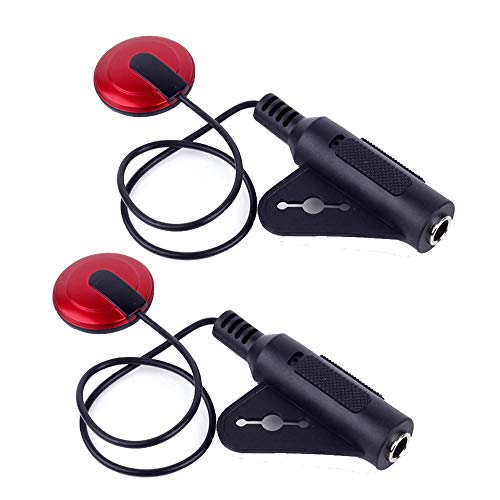How to Choose the Electric Guitar Pickups & Pickup Covers
Everything You Need To Know About Electric Guitar Pickups

- 1. Everything You Need To Know About Electric Guitar Pickups
- 1.1. Understanding Electric Guitar Pickups
- 1.1.1. What Is A Electric Guitar Pickup?
- 1.1.2. How Pickups Work
- 1.2. Factors Affecting Pickup Sound
- 1.2.1. Magnet Types
- 1.2.2. Coil Wire
- 1.2.3. Pickup Position
- 1.3. Customization and Modifications
- 1.4. Choosing The Right Electric Guitar Pickup
- 1.4.1. Pickup Types
- 1.4.2. Sound Preference
- 1.4.3. Magnet Types
- 1.4.4. Output Level
- 1.4.5. Pickup Configuration
- 1.4.6. Wiring and Controls
- 1.4.7. Playing Style
- 1.4.8. Guitar Body Wood
- 1.4.9. Cost Of A Pickup
- 1.5. Emerging Technologies and Innovations
- 1.6. Conclusion
- 1.1. Understanding Electric Guitar Pickups
Electric guitar pickups are a fundamental component of an electric guitar, responsible for converting string vibrations into electrical signals that can be amplified and heard through speakers. These devices are crucial in shaping the tone and sound of an electric guitar, making them a key focus for musicians, enthusiasts, and manufacturers.
Understanding Electric Guitar Pickups
What Is A Electric Guitar Pickup?
An electric guitar pickup is a fundamental component of an electric guitar that captures the vibrations of the strings and converts them into electrical signals. This device essentially "picks up" the sound produced by the vibrating strings and transmits it to an amplifier or other sound equipment.
Electric guitar pickups significantly contribute to a player's tone and play a crucial role in shaping the overall sound of the instrument. Different pickups, such as single-coil or humbucker pickups, offer distinct tonal characteristics, affecting the guitar's sound quality, clarity, and even its susceptibility to interference or noise. Players often choose pickups based on the musical genre they play and the specific sound they wish to achieve.
How Pickups Work
Pickups consist of a magnet or series of magnets wrapped with a coil of wire. When the guitar strings vibrate over these magnets, they disrupt the magnetic field, inducing a small electrical current in the coil. This current is then sent through the guitar's electronics, and eventually to an amplifier, where it is converted into sound.
Factors Affecting Pickup Sound
Magnet Types
Different materials and types of magnets, such as Alnico and ceramic, significantly influence the pickup's sound. Alnico magnets are known for their warm, vintage tone, whereas ceramic magnets produce a stronger, clearer, and sometimes more aggressive sound.
Coil Wire
The gauge and composition of wire used in the coil can impact the pickup's output and tonal characteristics. Thicker wire tends to produce a higher output and can result in a darker, more powerful sound, while thinner wire might offer a clearer, more articulate tone.
Pickup Position
The placement of pickups on the guitar also plays a crucial role in tonal variation. Pickups near the bridge offer a brighter sound, while those near the neck provide a warmer and more rounded tone.
Customization and Modifications
Guitarists often modify their instruments by changing pickups to achieve specific tones. Some even mix different types of pickups on one guitar for versatile sound options. Additionally, aftermarket pickup manufacturers offer a wide array of options, allowing players to tailor their instruments to their preferences.
Choosing The Right Electric Guitar Pickup
Choosing the right electric guitar pickup is a crucial decision for any guitarist. The pickup is the heart of an electric guitar, responsible for converting string vibrations into electrical signals, ultimately shaping the instrument's tone and character. With an array of pickup types, designs, and specifications available, selecting the ideal one can significantly impact the sound and performance of your instrument. Here are several essential factors to consider when choosing an electric guitar pickup.
Pickup Types
- Single-Coil: Single-coil pickups offer a bright, clear, and articulate sound. They are known for their crisp tones and are often found in guitars such as the Fender Stratocaster. However, they are more prone to picking up interference or hum.
- Humbucker: Humbuckers provide a thicker, warmer, and more powerful sound. They were developed to eliminate the hum present in single-coil pickups by using two coils that cancel out interference. Humbuckers are commonly associated with Gibson guitars and are preferred for heavier genres.
- P-90: P-90 pickups offer a middle ground between single-coils and humbuckers. They provide a balanced, punchy sound, and are favored for their unique tonal characteristics.
Sound Preference
Consider the genre and style of music you'll primarily play. Different pickups suit various musical genres; for example, single-coils are favored in genres like blues and surf, while humbuckers are well-suited for rock and metal.
Magnet Types
Pickups use different types of magnets like Alnico and ceramic. Alnico magnets generally offer a warmer and more vintage tone, while ceramic magnets tend to produce a more aggressive, powerful sound.
Output Level
Pickups vary in their output levels, affecting the guitar's overall volume and how hard they drive the amplifier. Higher output pickups can push amps harder and yield more distortion.
Pickup Configuration
Consider the pickup configuration on the guitar - whether it's a single pickup, two pickups, or a combination (e.g., bridge, neck, and middle pickups on a Stratocaster). Different configurations offer diverse tonal possibilities.
Wiring and Controls
Some pickups are wired to allow for coil-splitting, series/parallel switching, or phase inversion, providing additional tonal versatility. Consider the controls and wiring options that could expand your sonic palette.
Playing Style
Your playing style influences the pickup choice. For instance, if you're into intricate fingerpicking, a bright and clear single-coil might be suitable. If you prefer heavy riffing and distortion, a high-output humbucker might be more fitting.
Guitar Body Wood
The wood of the guitar body can interact differently with various pickups, influencing the overall tone. For instance, a brighter pickup might balance well with a warmer tonewood.
Cost Of A Pickup
The cost of pickups varies significantly, spanning from $30 to $300 or beyond, contingent upon factors such as quality, materials, and brand. For beginners, opting for a more affordable pickup is advisable, allowing the opportunity to explore preferences without incurring significant costs. However, if aiming for a particular sound, investing a bit more might be necessary.
Emerging Technologies and Innovations
The world of electric guitar pickups has seen continuous innovation. Companies have explored noiseless single-coil designs, active pickups that use an onboard preamp for increased signal strength and tonal shaping, and piezo pickups that capture acoustic-like tones.
Conclusion
Electric guitar pickups play a crucial role in defining the sonic character of an electric guitar. Familiarity with how they operate, the distinctions among different types, and how materials and placement affect tone empowers guitarists to thoughtfully select their instrument's sound. Whether drawn to the classic allure of single-coils, the robustness of humbuckers, or the adaptability of modern innovations, the landscape of electric guitar pickups remains dynamic, providing limitless prospects for musicians to shape their perfect sound.










